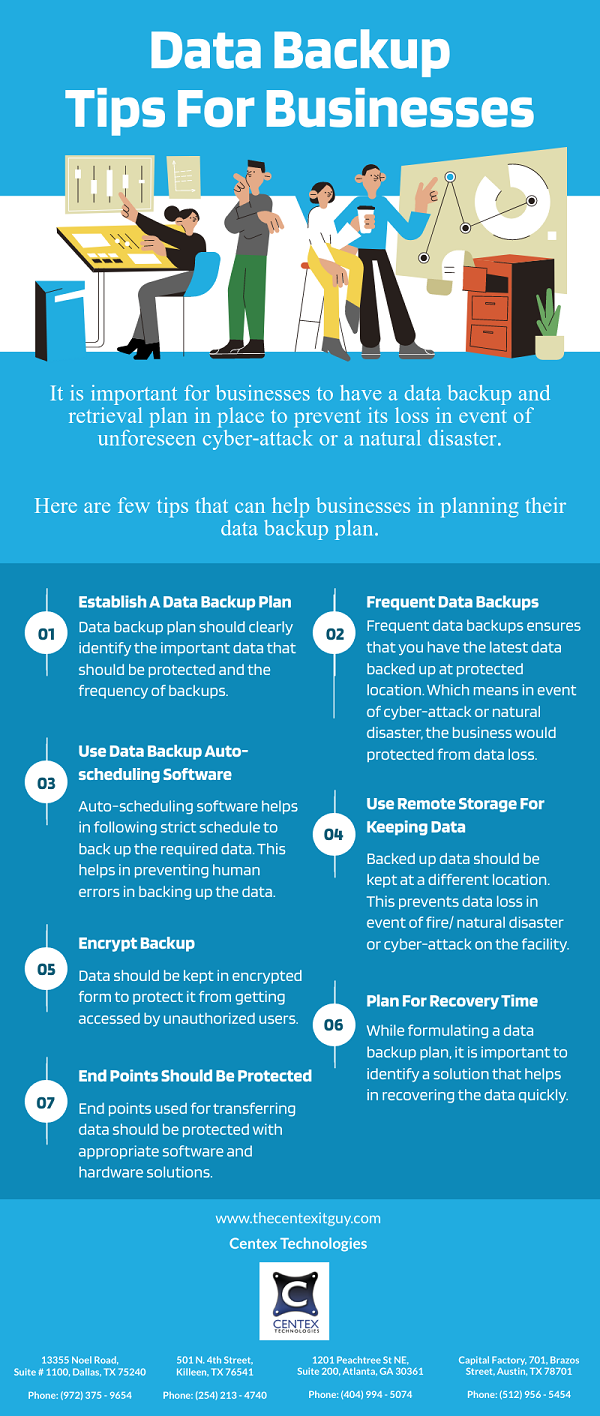PDF Version: Data Backup Tips For Businesses
Tag: Business
Businesses of all sizes may use Internet to access and use different computer-based or cloud hosted tools and databases to work efficiently. This makes it important for businesses to have data security as a part of their overall strategy. Small organizations may safeguard their on-premise data by fulfilling these five requirements:
Gathering, categorization, and storage of data
Create a centralized list of various kinds of data collected, collection procedures and storage facilities available and in use. Verify whether the collected data is stored safely and is secured by various authentication mechanisms. Sensitivity of every kind of data varies on the basis of a lot of parameters. Email lists, for example, must be protected, but their level of confidentiality is far lower than that of customer records, such as Credit Card information. By classifying data according to confidentiality and the consequences if their privacy is compromised, you may obtain a sense of what your security program requires.
Law of the land
Depending on your sector of work and your business location, you may be subject to legal compliance
obligations. These are the rules that govern how you get, manage, store, and transmit sensitive data. These
may alter based on your industry, geography, and who or where your customers are. Business owners must
clearly describe the infractions and their repercussions, which must be read and understood by all workers.
Threats and dangers
A risk assessment aids in the discovery of flaws in the security implementation strategy. Determine what forms of personal data are regulated and what efforts are being done to ensure compliance. It’s important to examine the risks that unregulated PII poses to reputation, competitiveness, security, and other factors. From the most likely to the least likely, threat sources are rated. Controlling procedures and precautions are examples of risk management approaches you may apply. Insider threats are sometimes disregarded because they aren’t always carried out maliciously. Negligent behaviors and errors, which are also insider risks, can lead to a data breach or data destruction. The outcome usually costs regulatory fines, reputational damage, and financial loss to the business. Security solutions to protect against both unintentional and intentional insider attacks is a must.
Data retention and disposal
Data is stored and saved by any business for a certain period of time as deemed fit to their business application and compliance requirements. While saving as much data as possible may seem like a good thing, confidential data can become a security risk if left unmanaged. Examine your organization to discover what data may be deleted. Customers who have moved away, or had their service terminated, as well as old personnel data, are just a few examples. People who have asked for their personal information to be removed and data discovered on unused devices or in accounts that have been abandoned. Data, especially PII, accumulates over time, “cleaning your house” can both save you money and reduce your risk.
Policies should be reviewed, updated, and upgraded
Examine your entire security program to determine which safeguards need to be updated. Similarly, make sure you’re using the most up-to-date technology and solutions to safeguard sensitive data. Setting up SOCs and NOCs, as well as developing holistic IT strategies, can help firms stay one step ahead of attackers. As a result of the introduction of new data privacy legislation, your policies may need to be revised. Examine your internal security policies and develop policies that include best-practice security procedures. Maintaining compliance with the SOC2 framework and CIS benchmarks criteria helps ensure the security of the data you store and handle.
Centex Technologies provide data security solutions for businesses. The IT security specialists work with clients to provide customized security solutions for their business. For more information, call Centex Technologies at (254) 213 – 4740.


